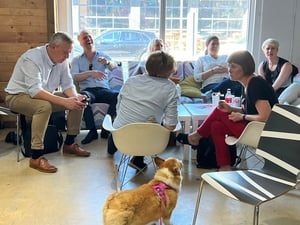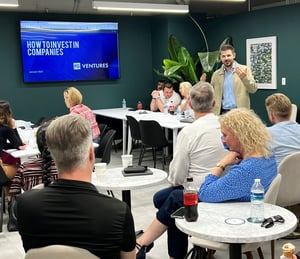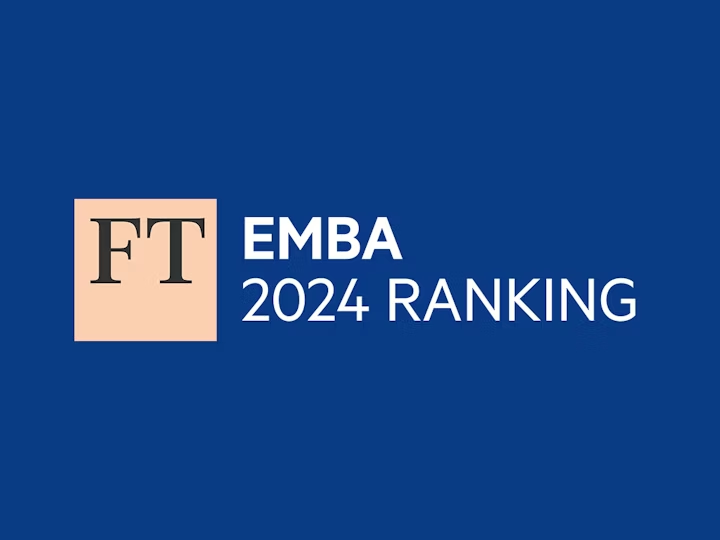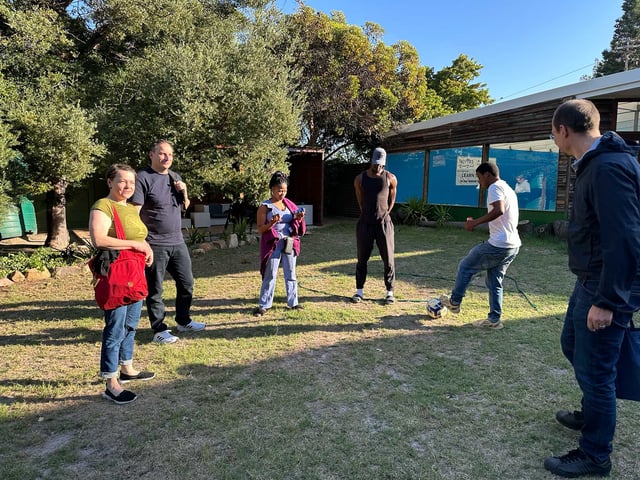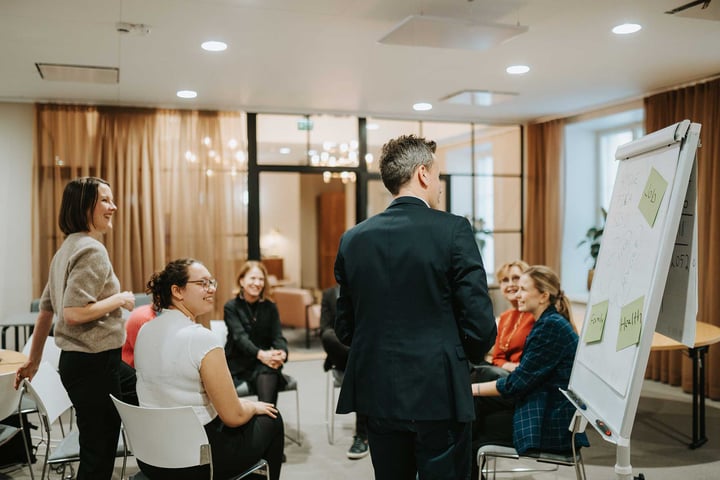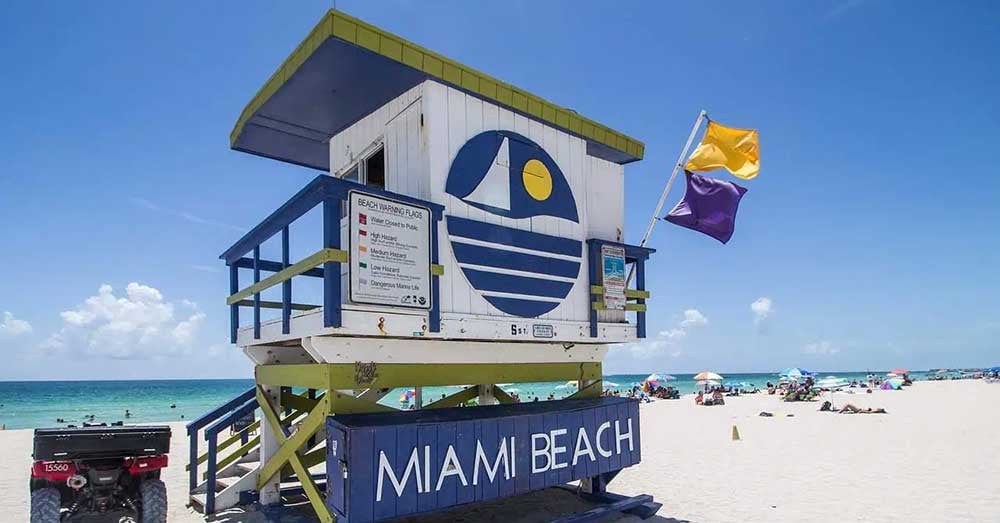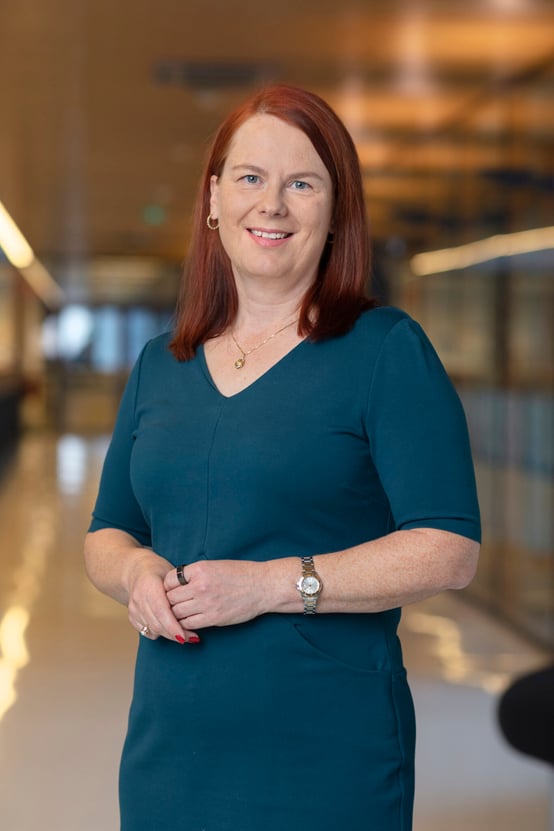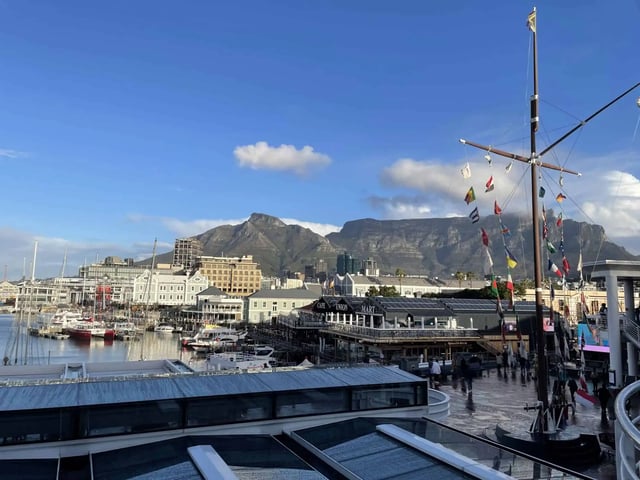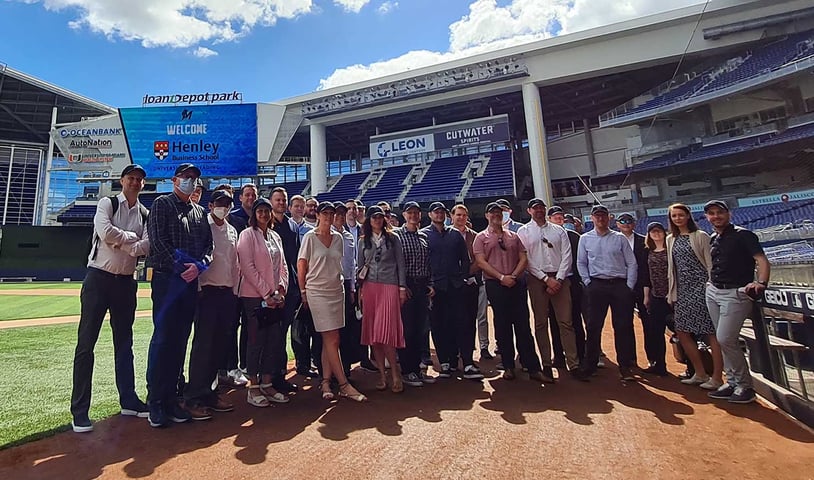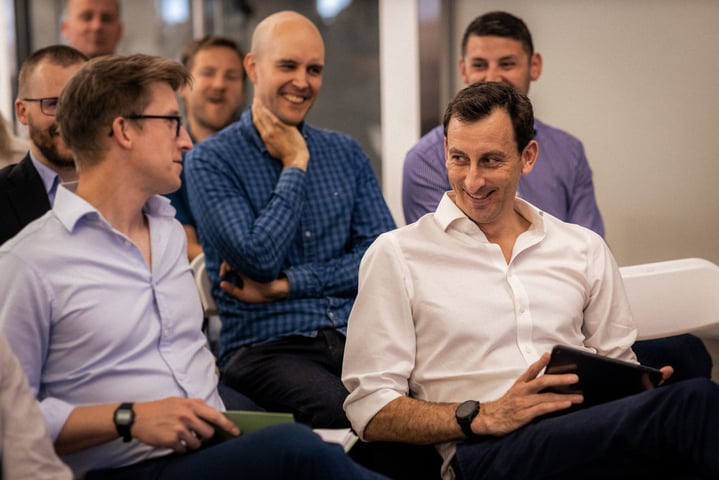Hanna Heikkilä, a Henley alumni, talks about her experience during the North American Global Immersion Study Visit. She dwells into the content of the GISV in Miami, and everything she learned throughout this experience.
One of the main reasons I selected Henley’s Executive MBA programme was the inclusion of two immersion study visits as part of the curriculum. Our group has just returned from a wonderful week in Miami, where we were immersed in the local culture and learned about international business and entrepreneurship from various perspectives. I used the opportunity and travelled to Miami a few days in advance to enjoy some sunshine, a rare phenomenon in Finland in January.
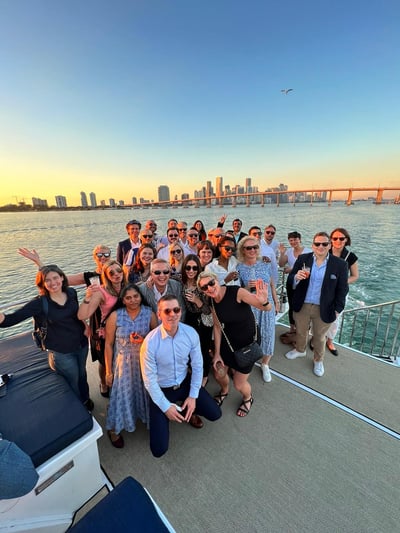 The task for approximately 30 Henley students from Finland, Denmark and the UK was to consult three different companies on their internationalisation strategy. The work started before we left for Miami, where we presented our first thoughts to the company, our student colleagues and our professors. The discussions and feedback gave us further ideas and thoughts on how to finalise our assignments once we’re all back home.
The task for approximately 30 Henley students from Finland, Denmark and the UK was to consult three different companies on their internationalisation strategy. The work started before we left for Miami, where we presented our first thoughts to the company, our student colleagues and our professors. The discussions and feedback gave us further ideas and thoughts on how to finalise our assignments once we’re all back home.
My team worked with a company called JOI , a company producing plant-based milk concentrate without preservatives or added sugar. Their products come in paste or powder form, and you just add water. The company got off to a commercial start in 2019 and is now looking to internationalise. The first part of our assignment was to analyse the company’s strengths and weaknesses.
In addition to the group work, we listened to guest speakers who gave their views on entrepreneurship. They included, for example, Cuban-born Augusto Vidaurreta, who told about his business successes and failures in a new country, Tana M Llinas, who shared how her brand agency was born, and Derek Distenfield, who presented “derekisms” on how a capital venture investor decides where to invest and what his role is with start-ups.
All the speakers emphasised the role of Miami as the capital of Latin America. It seemed like the city provides a great spot for entrepreneurs and a place where start-ups can thrive. It’s a true melting pot. As one of my fellow students accurately described it: Miami is like putting all of Latin America in a shaker and then giving the mixture an American boost.
I’ve worked most of my career in an HR role in big corporations, and the entrepreneurial world is one I do not have access to in my daily work. Although I may not be able to apply the learning directly to my work in global talent management at Valmet, I find the dynamics and topics around start-ups very interesting.
I also appreciated how the programme took us to a different location in Miami for each day of the module so that we were able to get a glimpse of different parts of Miami. To complete our immersive experience in Miami, some of us ended the week with a visit to Superblue Miami, an immersive art exhibition that surrounded us with new multi-sensory and interactive worlds created by some of today’s leading artists.
The modules in the Henley MBA have so far been very different from each other and that provides a motivating variety to the studies. This module is very different from the ones in Stage 1, as it does not have as much structured learning as the others. So before going, it’s good to calibrate your expectations. You need to take more responsibility yourself for what you want to learn or take out of the immersive experience.
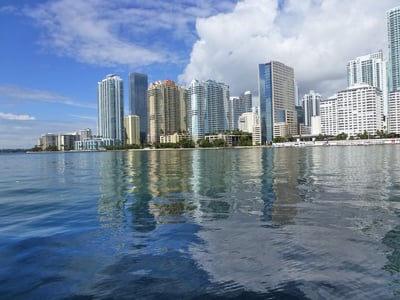
Despite the inspiring module content and fascinating guest speakers who provided loads of useful insights, the most valuable part of the trip was to get to know my fellow students from all three countries better. Working together with such a diverse and smart group of people is an invaluable experience. I was really impressed with the presentations that each group gave on their projects. And working together with my team members from Denmark, the UK, Panama and Finland has not only provided great learning experiences but also was a lot of fun!
Hanna Heikkilä - EMBA Alumni
Learning from companies with a passion to grow globally
The Henley Executive MBA programme has a mandatory International Business module designed to give students an immersive experience with start-ups or smaller-sized companies that aim to grow globally. Dr Peder Greve explains how the North America Global Immersion Study Visit began and why it has been so immensely popular.
“The objective of this programme is to look at companies that aim to go global,” says Dr Peder Greve, Associate Professor of International Business at Henley Business School. The programme is designed to give students an immersive experience with start-ups and smaller impact-driven companies open to student teams helping them formulate international strategies or a “go global” roadmap.
Greve originally considered larger companies but felt that start-ups and smaller companies would benefit more, and the work would have a larger impact. He also considered other regions in the world, such as Asia, for this programme but decided US culture would be more receptive to open discussions during the 10-week-long EMBA project.
The first programme got off the ground with two groups of cohorts in New York in May 2020 – with virtual immersions due to COVID-19, although this is not how the module had originally been planned.
It was only in January 2022 when a group of international cohorts made it to Miami for the first actual immersion trip. Austin, Texas, has recently been added to the programme as a new destination.
Culture of entrepreneurship
“I think North America is a place the rest of the world looks to for inspiration when it comes to international business entrepreneurship and business growth.” Greve says.
“I also think there’s a culture of innovation, ownership and risk-taking that comes naturally to North Americans, perhaps more so than for Europeans.”
There’s a very strong drive to let students experience North American culture first-hand alongside a CEO or founder of a company who puts their heart, soul and money into the company they’ve founded and want to grow.“The locations we’ve chosen feature companies that are quite ambitious. Their owners want to grow their companies quickly because that is part of the culture,” Greve explains.
Miami initially attracted Henley because a travel company partner had good connections there. It was also relatively easy to travel there after the pandemic compared to other areas.
“Miami is a real emerging hub for business, technology and innovation.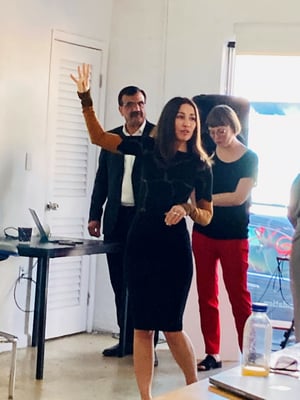 It’s one of the fastest-growing cities in the US for inward investment. A lot of highly skilled people have been moving there in the past few years because it is an attractive place to live, which appeals to the best talent,” Greve continues.
It’s one of the fastest-growing cities in the US for inward investment. A lot of highly skilled people have been moving there in the past few years because it is an attractive place to live, which appeals to the best talent,” Greve continues.
New York, too, was obvious due to its position as one of the big centres for international business. But it is losing some of its attractiveness because of the very high cost of living.“
That’s why we’re now going to Austin. We feel it fits our criteria of being a great place to do business and an attractive place to live,” Greve says. “It’s got culture, music and art. It’s a reasonably priced place to live and well organized. In some ways, it’s similar to Miami. We sometimes consider Miami to be the capital of Latin America because it is so internationally connected. But Austin is perhaps a new hub for North America. You have a lot of highly skilled people moving to the city from the US and other countries, as well.”
New destinations outside North America are also on the Henley radar – but nothing is set for certain yet.
Developing strategies for internationalisation
The focus of this particular programme is to create a full immersive experience for students to work on consulting projects with start-ups.
Teams from Henley UK, Denmark and Finland work together to develop an internationalisation strategy for their assigned local company. One of the core elements of the programme is meeting with their company face to face and interacting with them in the local environment as they discuss the initial analysis and findings completed by that point. The students then further shape their findings and deliver a final report about 2–3 weeks after the immersion trip.
“In this programme, it is essential for the students to experience the business environment and cultural elements. My overall goal is for them to start thinking differently,” Greve says.
“I want them to come back home and reflect on what they can learn from how business is conducted in this location. In what ways are these businesses organised better than the companies students know from their home environment? What do they appreciate about how business is carried out at home after they’ve seen how things work in other parts of the world?”
The immersion programme is designed to help students know the best of both worlds.
Inspiring, passionate stories
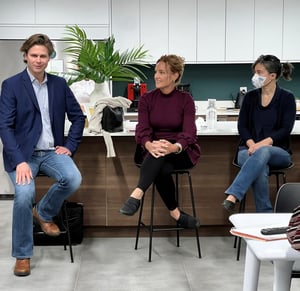 North American companies are quite open to the idea of having experienced executive students from Henley analyse them. Having the students evaluate their business model, their value proposition and other core elements offers them value.
North American companies are quite open to the idea of having experienced executive students from Henley analyse them. Having the students evaluate their business model, their value proposition and other core elements offers them value.
“We just need to be sure that the companies are the right ones for this module,” Greve says. “That’s why we look for founding entrepreneurs with personal motivation and a passion for what they’re doing. They must have a good story to inspire our students.”
“If there’s any concern from students that they may be working for a competitor or with companies possibly interested in acquiring these start-ups, we sign non-disclosure agreements to ensure we cover any issues,” Greve explains.
Success stories
Although the programme has not been running for many years, it shows promising results.
“Some North American companies are coming back to ask for a project with our students for the next phase in their strategy work,” Greve says. “We have also seen companies start to implement the strategies we have recommended – or something similar.”
Then there have been companies that have grown considerably, been acquired or attracted investment funding after the work of the Henley teams. One of the companies Henley worked with in Miami in 2022 was just acquired by Cisco for USD 370 million.
“We cannot say that happened because of Henley’s work,” Greve says, “but it probably didn’t hurt. Let’s just say we are very proud to have worked with a company that has achieved such a great outcome – as well as with other companies that have attracted investments in the tens of millions of dollars.”
Still other start-ups in the programme have almost disappeared or been acquired or merged with bigger companies. But this is the nature of start-ups – not all work out.
High level of quality and engagement
Greve keeps in touch with the companies to see how they are doing after the projects. “They usually see a lot of value in working with our students and are genuinely surprised by the quality of work our students deliver and their level of engagement.
They also feel they get a lot more from the programme than just the final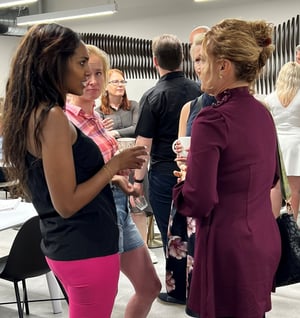 written report,” he says.“It’s more about the entire understanding they get by working with MBA students from other parts of the world and how the students see these companies,” Greve explains. “People from the UK, Denmark and Finland tend to be quite direct and critical. Our Henley students are used to questioning things they don’t understand and will tell you straight out if they don’t agree with something. This direct feedback has been highly valued by the companies we’ve worked with in North America.”
written report,” he says.“It’s more about the entire understanding they get by working with MBA students from other parts of the world and how the students see these companies,” Greve explains. “People from the UK, Denmark and Finland tend to be quite direct and critical. Our Henley students are used to questioning things they don’t understand and will tell you straight out if they don’t agree with something. This direct feedback has been highly valued by the companies we’ve worked with in North America.”
For the students, this immersion study shapes their entire MBA experience. It changes the way they look at business and has even inspired some to start their own company – or undertake something new they hadn’t thought of before.
“The programme is designed to inspire. It’s a very humbling experience for students to work alongside someone who is putting their whole life into something – and to feel they are contributing to this and taking responsibility for the best outcome,” he says.
At the forefront of innovation
Greve says this programme is also helping Henley to build its network and reputation as an innovative business school at the forefront of global immersion study visits – with both the International Business module in North America and the Reputation and Responsibility module in South Africa.
“We are constantly looking for ways to improve our programme and introduce new features,” he says.
Henley’s compulsory North American and South African immersion modules are organised two or three times per year. They are offered approximately six to eight months after a student joins the EMBA.
Dr. Peder Greve - Professor at Henley Business School
